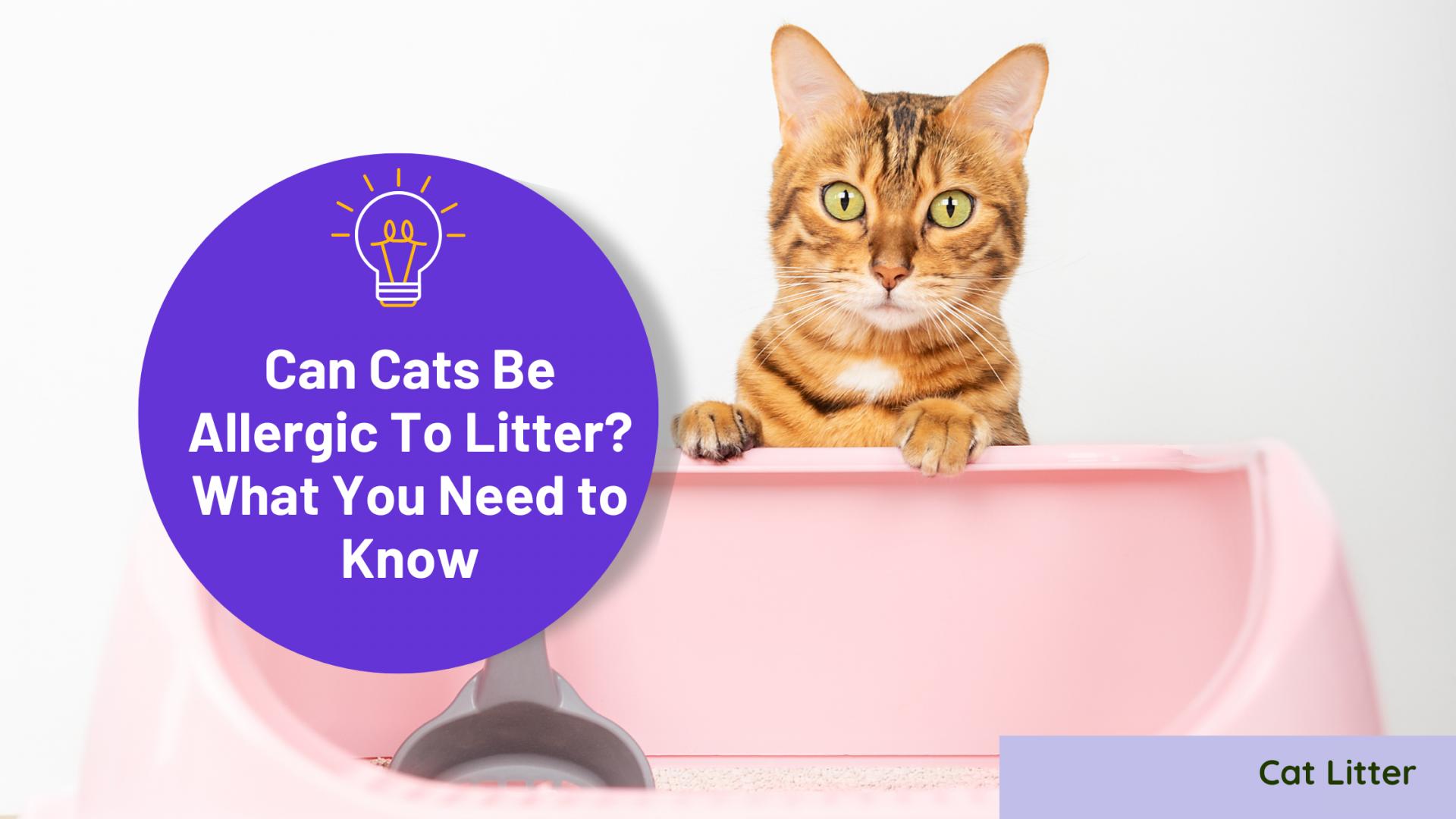When we think about allergies, we generally associate them with humans, but surprisingly, cats and other pets can be affected too.
Allergies are never pleasant to deal with, but animals are helpless, so naturally, you want to do all you can to alleviate your feline friend of any nasty symptoms they may be dealing with.
If you suspect that your cat may be having an allergic reaction to their litter, keep reading, we’ll tell you everything you need to know.
Can Cats Be Allergic to Litter?
While litter allergies are not all that common, they certainly do occur. Cats usually develop allergies to products they are repeatedly exposed to and litter can be one of them.
Along with physically touching litter every day, your cat is also breathing in dust and other particles that are present in their litter. This includes:
- Fragrances. Scented cat litter can help mask any unpleasant odors, but they could also be a common allergy trigger.
- Dust. Certain types of cat litter such as clay are known to create dust, which is spread when scooped or when a cat decides to dig. This too can lead to an allergic reaction.
- Natural shavings. Even though they’re mostly made with natural ingredients, wood, and nut-based cat litter can trigger allergies in cats.
- Mold. Cat litter that is made with natural ingredients can trigger mold growth and when not cleaned often enough, can cause an allergic reaction.
Unfortunately, there is no resounding evidence that has identified specific substances to be the root cause of cat litter allergies. It all depends on your cat as well as the type of litter you are using.
Common Cat Allergy Symptoms to Look Out For
Consulting with a vet is one of the best ways to determine whether your furry friend may be struggling with an allergy. However, there are also some symptoms to look out for to help you decide whether a vet visit is necessary.
- Your cat is scratching themselves more than usual.
- A noticeable skin rash has developed.
- Your cat often has irritated or watery eyes.
- Certain areas of your cat’s face have swelled.
- Your cat is coughing and sneezing more than usual.
- Your cat doesn’t want to use their litter box anymore.
These symptoms can be a clear indicator that your cat is reacting to their litter or something else in their home. A qualified veterinarian will be able to tell you whether your cat may have an allergy or another medical problem.
What Causes a Cat Litter Allergy?
Fragrances and dust produced by cat litter can be some of the most common reasons for your cat’s allergy, but every cat is affected differently.
Certain types of litter do contain chemicals and bentonite that could also be the cause of the allergic reaction. And, if your cat has already been diagnosed with an allergy, their litter could be exacerbating the problem.
Your feline friend’s age could also play a role. The immune systems of kittens and senior cats aren’t as strong, so they’re more susceptible to irritants.
What to Do If Your Cat Is Allergic to Litter
If your cat has been diagnosed with an allergy or you suspect their litter may be the issue, the first step is to switch to a different variant.
It’s important to do this gradually though so that your cat still wants to use their litter box. You can start by mixing a new type of cat litter with their existing litter until eventually you’re only using the new litter.
An unscented, low-dust cat litter is a good place to start. Just know that if you opt for a natural litter you will need to clean it more regularly to avoid any mold issues.
You may also want to look at the type of litter box you’re using. An open litter box that allows for more ventilation is generally a better option for cats with allergies. Keeping the litter box near an open window will also help with airflow.
The Best Cat Litter for Allergies
It’s important to remember that switching to a new type of cat litter may require some trial and error. Just because a new litter isn’t triggering your cat’s allergies doesn’t necessarily mean they will want to use it.
Here are some options to consider when making the switch.
Dr. Elsey’s Precious Cat Ultra Clumping Clay Cat Litter
This hypoallergenic cat litter is almost 100% dust-free and unscented, making it a top choice among cat owners with an allergic cat – we are also big fans. It’s even more ideal for your home if you also suffer from allergies.
As a clumping cat litter, Dr. Elsey’s is easy to clean and will reduce the chances of moisture pooling in your cat’s litter tray. As an added bonus, the formula is also low-tracking, so won’t be sweeping up as much excess cat litter as usual.
World’s Best Clumping Corn Cat Litter
World’s Best is one of today’s leading cat litter brands and this corn variety is ideal for kitties with irritated noses. This is a bit pricier than other options, but the whole-kernels really help reduce odors and the clumping formula makes daily scooping much easier.
This particular variety is mildly scented with a natural lavender oil, so you may need to gauge whether your cat is a fan. The only potential downside to this litter is that if you need to fill more than one litter box, the costs could add up pretty quickly.
Naturally Fresh Clumping Walnut Cat Litter
This biodegradable, all-natural litter from Naturally Fresh is ideal if your cat has had a reaction to ingredients such as corn, pine, or wheat.
The fact that this cat litter is environmentally friendly is a major plus, but it does produce some dust. However, dust is minimal and shouldn’t be a problem for most cats. Even though this is a popular choice among pet owners who have cats with allergies, it is also one of the more pricier options.
Tidy Cats Free & Clean Unscented Clumping Clay
Made by Purina, the Tidy Cats clumping clay litter is affordable and 99.9% dust-free, which should reduce your cat’s allergic reactions.
Even though this litter is unscented, it does contain activated charcoal, so it does a great job of masking unpleasant odors. We also love the fact that it comes in a bucket. It makes the cat litter much easier to manage and store.
Cat Litter Alternatives
There are a number of alternatives to traditional cat litter, most of which are made from natural ingredients. Corn is one of the most popular alternatives as it is known to be one of the more hypoallergenic ingredients.
Wheat husks are another option, however, some cats don’t enjoy the texture and the larger size of these husks, so you may need to give it a try to see how your furry family member responds.
Some cat owners have chosen to add sand to their litter boxes instead, which can be ideal, but cleaning can be a bit more difficult and tedious. Shredded newspaper could also work, but the same applies in terms of cleaning.
Final Thoughts
Changing up your cat’s litter can be one of the easiest ways to help them overcome their allergy symptoms, but it will probably require some trial and error because it’s not always clear what your cat may be reacting to.
Visiting your local vet can also be a big help. Your cat may not be allergic to their litter at all. It could be something else in your home or even their food that’s causing a reaction. It could even come down to a simple skin issue that could be treated with medication.
If you are noticing a change in your cat’s behavior and health, it’s important to take action as soon as possible to ensure a happy and healthy environment for them.
Cat Litter Allergy FAQs
1. Can you be allergic to cat litter?
If you’ve just brought a cat home or you’re trying a new cat litter and are experiencing allergy-related symptoms, cat litter could be the cause. The dust that’s generated by cat litter and tracked through your house can cause an allergic reaction. You may even notice that your symptoms are worse when changing your cat’s litter box. Consult with a doctor if you think you might be allergic to cat litter.
2. What is the best alternative to cat litter?
Clay cat litter is often one of the most common triggers for allergies in cats and even humans. If you’re currently using clay cat litter, consider switching to another variant such as pine, wheat, paper, corn, or even natural sand.


 0 comments
0 comments Copy link
Copy link Share on Twitter
Share on Twitter Share on Facebook
Share on Facebook Share on WhatsApp
Share on WhatsApp
Comments(0)